- News
- World News
- Pakistan News
- August deadliest month in Balochistan in six years, reports say
Trending
August deadliest month in Balochistan in six years, reports say
The Pakistan Institute for Conflict and Security Studies reported that August was the most violent month in Balochistan in six years. Across Pakistan, 254 people were killed primarily due to militant attacks. Quetta, Kech, Awaran, and Khuzdar experienced high numbers of enforced disappearances. The region faces ongoing violence and severe human rights abuses.

Representative image
QUETTA: The Pakistan Institute for Conflict and Security Studies (PICSS), a think tank based in Islamabad, reported that August has been the most violent month in Balochistan in the past six years.
According to PICSS, there has been a 'dangerous increase' in anti-government violence in Pakistan during August, making it the most turbulent month in this period, with Balochistan recording the highest number of deaths.
PICSS released a report on Monday indicating that at least 254 people were killed across Pakistan in August, including 92 civilians, 108 militants, and 54 armed soldiers. Furthermore, 150 people were injured in various incidents, with 88 of them being civilians.
The majority of fatalities in Pakistan were attributed to 83 militant attacks, which resulted in the deaths of 175 individuals, including 92 civilians, 47 security personnel, and 36 militants. Additionally, 123 people were injured, with 88 civilians and 35 security personnel among them. August has been noted as the deadliest month since July 2018.
The situation in Balochistan is marked by significant challenges and unrest. The region has faced a surge in violence, with frequent militant attacks and ongoing extrajudicial killings. The security situation remains volatile, contributing to a heightened level of instability and human rights abuses. Despite international and local efforts to address these issues, Balochistan continues to grapple with severe
The human rights situation is dire, characterized by ongoing conflict between separatist groups and the government, which has led to violence and military operations. Enforced disappearances are a serious issue, with many individuals being taken by security forces and held without charge. Freedom of expression is severely restricted, with journalists and activists facing threats and suppression, the report stated.
Despite being resource-rich, the province remains economically marginalized, contributing to local grievances. Additionally, the conflict has caused significant internal and cross-border displacement. The lack of effective legal recourse and accountability for human rights abuses further exacerbates the problem, making the situation complex and deeply troubling.
According to PICSS, there has been a 'dangerous increase' in anti-government violence in Pakistan during August, making it the most turbulent month in this period, with Balochistan recording the highest number of deaths.
PICSS released a report on Monday indicating that at least 254 people were killed across Pakistan in August, including 92 civilians, 108 militants, and 54 armed soldiers. Furthermore, 150 people were injured in various incidents, with 88 of them being civilians.
The majority of fatalities in Pakistan were attributed to 83 militant attacks, which resulted in the deaths of 175 individuals, including 92 civilians, 47 security personnel, and 36 militants. Additionally, 123 people were injured, with 88 civilians and 35 security personnel among them. August has been noted as the deadliest month since July 2018.
Reports from other Baloch human rights organizations highlighted that Quetta, Kech, Awaran, and Khuzdar experienced the highest numbers of enforced disappearances, with these districts reporting 10, eight, seven, and six incidents, respectively.
The situation in Balochistan is marked by significant challenges and unrest. The region has faced a surge in violence, with frequent militant attacks and ongoing extrajudicial killings. The security situation remains volatile, contributing to a heightened level of instability and human rights abuses. Despite international and local efforts to address these issues, Balochistan continues to grapple with severe
human rights violations and a deteriorating security environment.
The human rights situation is dire, characterized by ongoing conflict between separatist groups and the government, which has led to violence and military operations. Enforced disappearances are a serious issue, with many individuals being taken by security forces and held without charge. Freedom of expression is severely restricted, with journalists and activists facing threats and suppression, the report stated.
Despite being resource-rich, the province remains economically marginalized, contributing to local grievances. Additionally, the conflict has caused significant internal and cross-border displacement. The lack of effective legal recourse and accountability for human rights abuses further exacerbates the problem, making the situation complex and deeply troubling.
End of Article
FOLLOW US ON SOCIAL MEDIA










